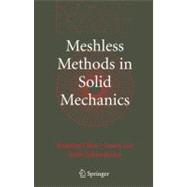
| Acknowledgments | vi | ||||
| Preface | vii | ||||
| 1 Introduction | 1 | (5) | |||
|
1 | (1) | |||
|
2 | (2) | |||
|
4 | (2) | |||
| 2 Fundamental of Continuum Mechanics | 6 | (25) | |||
|
6 | (5) | |||
|
11 | (5) | |||
|
16 | (4) | |||
|
20 | (4) | |||
|
24 | (7) | |||
| 3 Fundamentals of Finite Element Method | 31 | (24) | |||
|
31 | (2) | |||
|
33 | (4) | |||
|
37 | (5) | |||
|
42 | (1) | |||
|
42 | (5) | |||
|
47 | (1) | |||
|
48 | (4) | |||
|
52 | (3) | |||
| 4 An Overview on Meshless Methods and Their Applications | 55 | (13) | |||
|
55 | (5) | |||
|
60 | (3) | |||
|
63 | (4) | |||
|
67 | (1) | |||
| 5 Procedures of Meshless Methods | 68 | (15) | |||
|
68 | (2) | |||
|
70 | (2) | |||
|
72 | (2) | |||
|
74 | (2) | |||
|
76 | (1) | |||
|
77 | (1) | |||
|
78 | (3) | |||
|
81 | (2) | |||
| 6 Meshless Analysis of Elastic Problems | 83 | (30) | |||
|
83 | (5) | |||
|
88 | (7) | |||
|
95 | (6) | |||
|
101 | (4) | |||
|
105 | (5) | |||
|
110 | (3) | |||
| 7 Meshless Analysis of Nonlocal Continua | 113 | (12) | |||
|
113 | (1) | |||
|
114 | (2) | |||
|
116 | (1) | |||
|
116 | (1) | |||
|
117 | (2) | |||
|
119 | (3) | |||
|
122 | (2) | |||
|
124 | (1) | |||
| 8 Meshless Analysis of Plasticity | 125 | (28) | |||
|
125 | (4) | |||
|
129 | (2) | |||
|
131 | (3) | |||
|
134 | (9) | |||
|
143 | (8) | |||
|
151 | (1) | |||
|
151 | (2) | |||
| Appendix A Vectors and Tensors | 153 | (9) | |||
| Appendix B Representations of Isotropic Scalar, Vector, and Tensor Functions (Wang, 1970, 1971) | 162 | (3) | |||
| Appendix C Classification of Partial Differential Equations | 165 | (7) | |||
| Appendix D User's Manual: Meshless Computer Program for Electrostatics and Electrodynamics | 172 | (7) | |||
| Appendix E User's Manual: Meshless Computer Program for Analysis of Crack Growth in Elastoplastic Continuum | 179 | (7) | |||
| Bibliography | 186 | (10) | |||
| Index | 196 |
The New copy of this book will include any supplemental materials advertised. Please check the title of the book to determine if it should include any access cards, study guides, lab manuals, CDs, etc.
The Used, Rental and eBook copies of this book are not guaranteed to include any supplemental materials. Typically, only the book itself is included. This is true even if the title states it includes any access cards, study guides, lab manuals, CDs, etc.